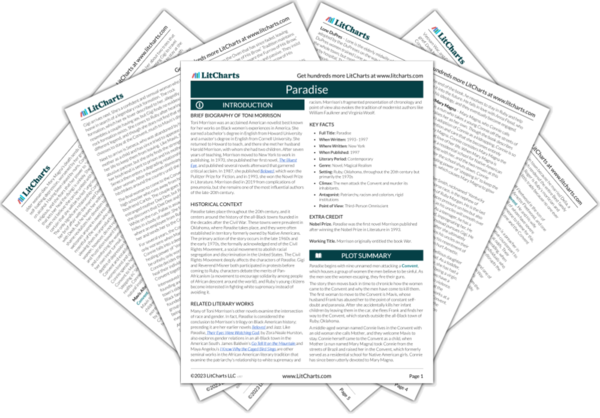Zechariah Morgan Quotes in Paradise
“No ex-slave would tell us to be scared all the time. To ‘beware’ God. […] No ex-slave who had the guts to make his own way, build a town out of nothing, could think like that. No ex-slave––”
Deacon Morgan cut him off. “That’s my grandfather you’re talking about. Quit calling him an ex-slave like that’s all he was. He was also an ex-lieutenant governor, an ex-banker, an ex-deacon and a whole lot of other exes, and he wasn’t making his own way; he was part of a whole group making their way.”
Having caught Reverend Misner’s eyes, the boy was firm. “He was born in slavery times, sir; he was a slave, wasn’t he?”
“Everybody born in slavery time wasn’t a slave. Not the way you mean it.”

Unlock explanations and citation info for this and every other Paradise quote.
Plus so much more...
Get LitCharts A+[Zechariah] missed witnessing the actual Disallowing; and missed hearing disbelievable words formed in the mouths of men to other men, men like them in all ways but one. Afterwards the people were no longer nine families and some more. They became a tight band of wayfarers bound by the enormity of what had happened to them. Their horror of whites was convulsive but abstract. They saved the clarity of their hatred for the men who had insulted them in ways too confounding for language: first by excluding them, then by offering them staples to exist in that very exclusion. Everything anybody wanted to know about the citizens of Haven or Ruby lay in the ramifications of that one rebuff out of many.

Zechariah Morgan Quotes in Paradise
“No ex-slave would tell us to be scared all the time. To ‘beware’ God. […] No ex-slave who had the guts to make his own way, build a town out of nothing, could think like that. No ex-slave––”
Deacon Morgan cut him off. “That’s my grandfather you’re talking about. Quit calling him an ex-slave like that’s all he was. He was also an ex-lieutenant governor, an ex-banker, an ex-deacon and a whole lot of other exes, and he wasn’t making his own way; he was part of a whole group making their way.”
Having caught Reverend Misner’s eyes, the boy was firm. “He was born in slavery times, sir; he was a slave, wasn’t he?”
“Everybody born in slavery time wasn’t a slave. Not the way you mean it.”

Unlock explanations and citation info for this and every other Paradise quote.
Plus so much more...
Get LitCharts A+[Zechariah] missed witnessing the actual Disallowing; and missed hearing disbelievable words formed in the mouths of men to other men, men like them in all ways but one. Afterwards the people were no longer nine families and some more. They became a tight band of wayfarers bound by the enormity of what had happened to them. Their horror of whites was convulsive but abstract. They saved the clarity of their hatred for the men who had insulted them in ways too confounding for language: first by excluding them, then by offering them staples to exist in that very exclusion. Everything anybody wanted to know about the citizens of Haven or Ruby lay in the ramifications of that one rebuff out of many.











